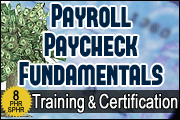Payroll Compliance Management
Payroll Compliance Management
Learn Payroll Laws, Reduce Risk, and Ensure Accurate, Compliant Payroll Processing
Payroll compliance is one of the most complex and highly regulated functions in HR. While payroll begins with calculating and issuing wages, it quickly expands into a maze of federal, state, and local regulations — each with their own deadlines, forms, exceptions, and reporting rules.
From worker classification and wage and hour requirements to multi-state taxation, garnishments, leave tracking, and benefit deductions, one mistake can expose your organization to compliance violations, fines, audits, and lawsuits.
This guide explains what payroll management is, how it differs from payroll operations, the most important areas of payroll compliance, common payroll errors employers must avoid, and recommended payroll compliance training programs to ensure your organization stays penalty-free.
What Is Payroll Management?
Payroll management refers to the full administrative process of managing employees’ earnings, deductions, taxes, benefits, and payments. This includes:
- Calculating wages, overtime, bonuses, and taxable benefits
- Processing reimbursements, deductions, and employer contributions
- Ensuring compliance with federal, state, and local payroll laws
- Submitting accurate payroll tax payments and filings
- Maintaining payroll records and documentation
- Issuing timely payments to employees
- Updating systems when laws or COLA limits change
But payroll management is not just issuing checks. It involves complex compliance obligations, including:
- Multi-state tax rules
- Wage garnishment laws
- Travel pay reimbursement regulations
- InPat/ExPat payroll compliance
- State-specific payroll deadlines
- Documentation and audit requirements
To manage payroll correctly, HR and payroll professionals must understand — and stay current on — all applicable rules. This is why ongoing payroll compliance training is critical.
Why Payroll Compliance Matters
The Hidden Risks of Poor Payroll Management
Payroll errors are among the most common sources of:
- Employee complaints
- Wage and hour lawsuits
- DOL investigations
- IRS penalties
- Garnishment and withholding violations
- Incorrect tax filings
- Costly back-pay awards
Payroll Compliance Training Areas
Below are the key areas of payroll compliance training. Each link provides an overview of the laws, requirements, common errors, and best practices for that area.
These areas represent the foundation of proper payroll compliance and should be part of any payroll certification or training program.
Payroll Training Options
What a Payroll Certification Course Should Teach You
To maintain proper payroll compliance, your organization needs a comprehensive and up-to-date payroll training program. Whether the course is titled:
- Payroll Specialist Certification
- Certified Payroll Professional Certification
- Certified Payroll Manager
- Payroll Compliance Certification
...your payroll program must teach both fundamentals and advanced compliance topics, with updates as laws change.
A strong payroll certification program should teach you how to:
- Correctly classify workers (employee vs. contractor)
- Determine exemptions and apply FLSA requirements
- Calculate gross pay, overtime, and deductions
- Identify, pay, and withhold federal, state, and local taxes
- Administer cafeteria plans, deferred compensation, and other benefit deductions
- Handle reimbursements, stock options, and relocation pay
- Apply garnishment and levy rules
- Complete and file payroll tax reports correctly
- Manage year-end payroll responsibilities
- Establish and maintain audit, recordkeeping, and disaster recovery processes
Many online payroll certification courses teach the basics but do not offer updates — leaving you vulnerable to new limits, rules, and regulatory changes.
Choose a payroll training program that includes ongoing payroll compliance updates.
Common Payroll Compliance Errors To Avoid
Payroll mistakes can occur at any stage of the process. A high-quality payroll certification course should prepare you to avoid the most frequent errors, including:
- Misclassification of employees vs. independent contractors
- Manual calculation errors
- Failure to update tax rates or contribution limits
- Overtime miscalculations
- Incorrect handling of pre-tax deductions
- Mishandling wage garnishments and child support orders
- Not accounting for protected leaves (FMLA, PTO, sick leave)
- Noncompliance with multi-state taxation rules
- Late tax filings or missed deadlines
- Outdated payroll systems or incorrect software settings
- Payroll software requirements
- Direct deposit regulations
- Payroll auditing procedures
- Reporting deadlines
- Record retention laws
Training is essential to avoid compliance failures, penalties, and employee disputes.

Multi-State Payroll Compliance
One of the Most Confusing Areas in Payroll Administration
Multi-state payroll is one of the most common sources of employer mistakes. Proper training should cover:
- Reciprocal agreements between states
- Withholding requirements for remote employees
- Local tax obligations
- State unemployment insurance differences
- Temporary job assignment rules
- Employer nexus and tax liability
How Is Payroll Management Different From Payroll Operations?
Payroll management refers to the overall strategic oversight of payroll functions, including compliance, systems management, and team leadership. Payroll operations involve the day-to-day tasks of running payroll accurately.
Payroll Operations Focuses On:
- Collecting hours

- Processing payroll
- Calculating wages
- Producing checks/direct deposits
- Making tax payments
Payroll Management Focuses On:
- Hiring and developing payroll staff
- Implementing fraud-prevention systems
- Selecting and managing payroll software
- Ensuring operational accuracy
- Overseeing audits
- Establishing processes and controls
- Maintaining compliance policies
- Meeting organizational goals
Both are critical - but payroll management sets the compliance standards for the entire department.
Payroll Compliance Best Practices
To improve payroll accuracy and protect your organization, payroll leaders should implement:
- Written payroll procedures
- A standard audit schedule
- Regular compliance training
- Automated calculations wherever possible
- Annual system updates
- Tools for tracking leave, overtime, and state taxes
- Multi-layer review processes
- Consistent onboarding and documentation standards
This adds ranking potential for payroll best practices, payroll compliance checklist, how to improve payroll accuracy.
How To Become a Payroll Specialist, Certified Payroll Professional, or Certified Payroll Manager
To become certified in payroll compliance and administration:
- Review available payroll certification courses
- Compare agendas and requirements
- Ensure the program includes regular updates
- Choose a course that teaches all major compliance areas
- Pass the certification exam
- Renew annually to stay compliant
The following online payroll certification programs meet these standards:
- Paycheck Fundamentals Training & Certification Program
- Payroll Reporting Training & Certification Program
- Payroll Operations Training & Certification Program
- Certified Payroll Administrator
Who Should Take Payroll Compliance Training?
These payroll compliance courses are ideal for:
- Payroll specialists
- HR professionals
- Payroll managers
- Accounting personnel
- Office managers
- Bookkeepers
- Finance team members
- Anyone responsible for payroll accuracy and compliance
Benefits of Earning a Payroll Certification
Earning a payroll certification helps you:
- Advance your HR or payroll career
- Build expertise in payroll laws and regulations
- Reduce errors and compliance risks
- Improve payroll accuracy and consistency
- Prepare for audits
- Increase organizational trust in the payroll function
- Stay updated as laws change



